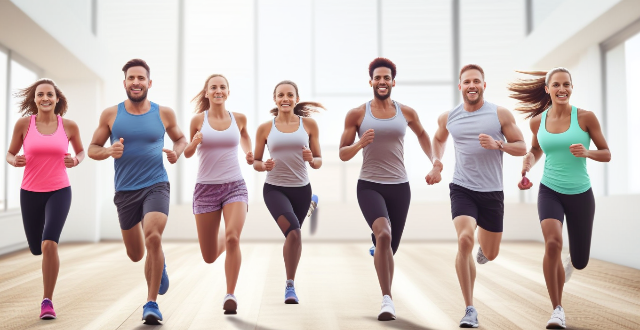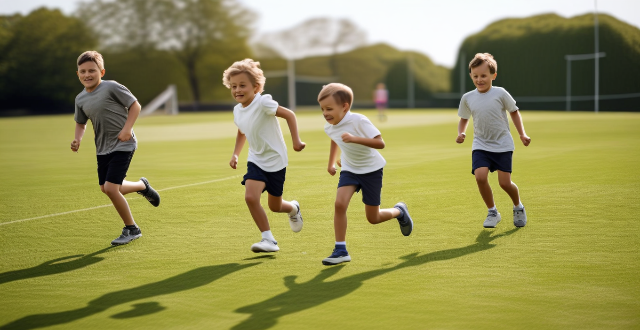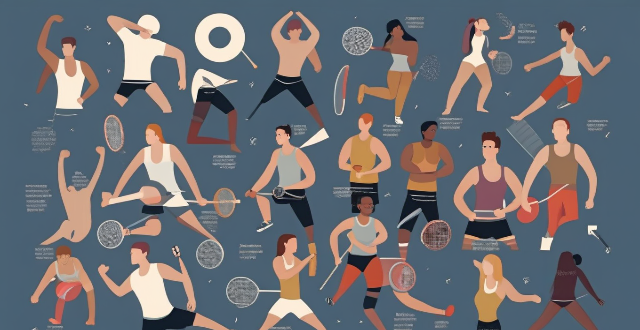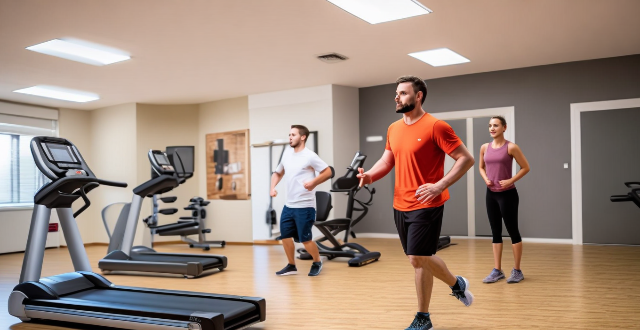Performance Enhance

What role does visualization play in sports performance ?
Visualization is a powerful tool that can enhance sports performance by improving focus, confidence, technique, recovery, and motivation. It involves creating mental images of desired outcomes or actions, which can lead to better concentration, increased self-efficacy, enhanced motor learning, reduced risk of injuries, and higher levels of motivation. By incorporating visualization into their training routines, athletes can strengthen their physical and mental capabilities, resulting in improved performance during competition and training.

What are the best ways to enhance athletic performance ?
Improving athletic performance involves a combination of physical, mental, and lifestyle factors. Here are some strategies that can help athletes reach their full potential: ## Physical Training ### Strength and Conditioning - Incorporating weight training helps build muscle strength and endurance. - Plyometrics exercises like box jumps and bounding improve power output, crucial for many sports. ### Technique and Drills - Perfect practice makes perfect; focusing on the quality of movements rather than just quantity. - Practicing game scenarios can enhance decision-making skills under pressure. ### Recovery - Light activities like walking or swimming can aid recovery. - Stretching and foam rolling help reduce muscle soreness and improve flexibility. ## Nutrition and Hydration ### Diet - Consuming a mix of proteins, carbohydrates, and healthy fats supports energy levels and recovery. - Drinking enough water is essential for maintaining performance and preventing cramps. ### Supplementation (When Needed) - Sports drinks during prolonged exercise can replenish electrolytes and provide energy. - Post-workout protein shakes can aid in muscle repair. ## Mental Preparation ### Visualization - Seeing yourself succeed in your mind's eye can boost confidence and focus. - Setting clear, achievable goals provides direction and motivation. ### Mindfulness and Stress Management - Meditation can reduce anxiety and improve concentration. - Controlled breathing can lower stress levels before and during competition. ## Lifestyle Habits ### Sleep - Athletes need adequate rest to recover physically and mentally. - Maintaining a consistent sleep schedule optimizes rest. ### Avoiding Negative Habits - Substances can impair judgment and harm performance. - High stress levels can negatively impact both physical and mental health.

How do QoS (Quality of Service) settings enhance network performance ?
Quality of Service (QoS) settings enhance network performance by prioritizing traffic, allocating bandwidth, managing congestion, and improving user experience. This is achieved through mechanisms such as traffic prioritization, bandwidth allocation, congestion management techniques, shaping and policing, and improved user experience. By implementing QoS strategies effectively, network administrators can ensure that critical applications receive the necessary resources and achieve optimal network performance.

Are there specific channels or bands that Wi-Fi 6 uses to enhance performance ?
**Wi-Fi 6 Channels and Bands: Enhancements to Performance** Wi-Fi 6, also known as 802.11ax, is the latest wireless standard designed to improve network capacity and efficiency in high-traffic areas. One of its key features is the ability to utilize specific channels and bands to enhance performance. The 2.4 GHz band has limited channel capacity and potential for interference, making it less suitable for Wi-Fi 6's performance enhancements. The 5 GHz band, on the other hand, offers significantly more channels and is the primary focus for Wi-Fi 6's enhancements. Within the 5 GHz band, Wi-Fi 6 networks can choose from a variety of U-NII and CRSA channels to optimize their performance based on factors like congestion, bandwidth requirements, and potential interference sources. By intelligently selecting and utilizing these channels, Wi-Fi 6 networks can achieve significant improvements in speed, latency, and overall network efficiency compared to previous Wi-Fi standards.

How can educational games be designed to effectively enhance learning ?
Designing educational games that effectively enhance learning involves a combination of educational theory, game design principles, and an understanding of the target audience. To create engaging and effective educational games, it is crucial to identify learning objectives, understand the target audience, incorporate educational theory, use engaging game mechanics, incorporate multimedia elements, provide opportunities for practice and repetition, include assessment and feedback mechanisms, foster collaboration and social interaction, and iterate and refine the game. By following these guidelines, you can design educational games that effectively enhance learning by engaging players, providing meaningful experiences, and fostering long-term retention of knowledge and skills.

How do online learning platforms enhance student engagement and performance ?
The article discusses how online learning platforms enhance student engagement and performance. It mentions personalized learning experiences, interactive content and multimedia, collaboration and communication tools, gamification and rewards, flexibility and convenience, and immediate feedback and support as key features of these platforms that contribute to improved student outcomes.

What kind of food and drinks should I consume to enhance my performance during exams ?
Proper nutrition is vital for exam performance, helping to maintain focus and energy. Recommended brain-boosting foods include lean proteins, complex carbohydrates, healthy fats, and antioxidant-rich items. Hydration is also key, with a suggestion to avoid sugary drinks and excessive caffeine. Meal ideas provide balanced options for breakfast, lunch, snacks, and dinner, emphasizing the importance of consistent healthy eating habits in the lead-up to exams.

What impact does female leadership have on organizational culture and performance ?
The impact of female leadership on organizational culture and performance is significant. Women leaders prioritize collaboration, diversity, emotional intelligence, innovation, financial performance, and customer satisfaction, leading to a positive work environment and business success.

What is sports psychology and how does it benefit athletes ?
Sports psychology is a specialized branch of psychology that focuses on the psychological and mental aspects of sports and physical activity. It involves the study of how an athlete's thoughts, emotions, attitudes, and behaviors affect their performance in sports or exercise. Sports psychologists work with athletes to enhance their mental skills, improve their performance, and cope with stress and pressure. Benefits include improved performance, enhanced motivation, emotional regulation, team cohesion, injury recovery, and career longevity.

What role does mental preparation play in improving running performance ?
Mental preparation is key to improving running performance. It involves setting clear goals, using visualization techniques, practicing mindfulness exercises, and employing self-talk strategies. By training the mind to focus on the task at hand, manage stress, and maintain motivation, runners can enhance their physical performance and achieve their running goals.

How does network expansion affect the overall network performance ?
Network expansion can significantly impact overall performance, offering benefits such as increased bandwidth, improved redundancy, and enhanced connectivity. However, challenges like compatibility issues, security concerns, and complexity management must be addressed to maintain optimal performance. Careful planning is crucial for successful network expansion.

How can nutrition affect an athlete's performance ?
Nutrition plays a pivotal role in an athlete's performance, providing essential energy, aiding recovery, and maintaining overall health. A balanced intake of macronutrients, such as carbohydrates for immediate energy, proteins for muscle repair and growth, and fats for long-term energy, is crucial. Micronutrients like vitamins and minerals also contribute to metabolic functions and electrolyte balance. Hydration is vital for fluid balance and preventing performance decline due to dehydration. Timing of nutrient intake, before, during, and after exercise, significantly impacts performance and recovery. Strategic dietary planning, including periodized nutrition and anti-doping compliance, ensures athletes meet their specific needs and maintain clean sport standards. Overall, a well-structured nutritional plan can enhance athletic performance and success in sports.

Can napping improve athletic performance ?
**Can Napping Improve Athletic Performance?** Napping is a common practice among athletes and non-athletes alike, but can it really improve athletic performance? Research suggests that napping can aid in physical recovery and enhance cognitive function. Physical Recovery: - **Muscle Repair**: Sleep produces growth hormone, aiding in muscle repair and growth. - **Reduced Inflammation**: Sleep reduces inflammation, leading to better recovery after exercise. Cognitive Function: - **Improved Focus**: A quick nap can improve focus and concentration for peak performance. - **Enhanced Learning**: Sleep consolidates memories, allowing athletes to learn from mistakes and improve skills faster. Effective Napping Tips: Timing: - **Power Naps**: Limit naps to 20-30 minutes to avoid deep sleep and feeling groggy upon waking. - **Timing Before Bedtime**: Avoid napping too close to bedtime to prevent disrupting the nighttime sleep cycle. Environment: - **Quiet and Dark**: Find a quiet, dark place to nap for better sleep quality. - **Comfortable Surface**: Choose a comfortable surface to prevent waking up with aches and pains. In conclusion, napping can improve athletic performance by aiding physical recovery and enhancing cognitive function. It's important to nap effectively by timing your naps appropriately and creating a comfortable environment.

How can sports medicine improve an athlete's performance ?
Sports medicine can improve an athlete's performance by focusing on injury prevention and management, optimal recovery strategies, mental health support, performance enhancement through strength and conditioning programs, biomechanical analysis, pain management, and medical care and treatment. It involves a holistic approach to addressing an athlete's physical health, mental well-being, nutrition, and recovery processes.

How can psychology improve an athlete's performance ?
The article discusses how psychology can improve an athlete's performance by addressing various psychological factors that can influence their mindset and behavior. The author provides a topic summary of the main points covered in the text, which includes goal setting, self-talk, stress management, confidence building, and team dynamics. Each section explains the objectives and benefits of each technique and how they can be applied to enhance an athlete's mental toughness, resilience, and winning mindset. The conclusion emphasizes the importance of incorporating psychology into an athlete's training regimen for overall well-being and enjoyment of sports.

How do psychological factors influence sports performance and research ?
This document discusses the influence of psychological factors on sports performance, emphasizing the importance of motivation, confidence, concentration, resilience, and team dynamics. It highlights how these elements can enhance or hinder athletic performance and underscores the significance of research in understanding and applying psychological principles to optimize athlete mental states. The text concludes by noting the potential for ongoing research to refine our comprehension and application of psychology in sports, aiming to help athletes achieve their full potential mentally and physically.

How does music affect athletic performance ?
Text is about how music can affect athletic performance. It explains the ways in which listening to music while exercising or competing can increase motivation, improve focus, reduce the perception of effort, and distract from pain and fatigue, leading to better performance and results.

Can reading about sports help improve one's own athletic performance ?
Reading about sports can enhance athletic performance by providing insights into techniques, strategies, and mental approaches. It helps in technique improvement, mental preparation, and injury prevention. To apply this knowledge, set clear goals, choose relevant resources, practice what you learn, and seek feedback for adjustments.

Can wearable technology improve athletic performance ?
The text discusses the potential benefits of wearable technology for athletes. Wearable devices can provide real-time feedback, goal setting and tracking, motivation, injury prevention, and data analysis to improve athletic performance. However, they should not replace traditional training methods or professional coaching. Athletes should use them as a tool to complement their existing training program and consult with experts when making decisions about their training and performance goals.

Can AI improve sports performance and athlete safety ?
Artificial Intelligence (AI) is transforming the sports industry by enhancing athletic performance and ensuring athlete safety through personalized gear design, optimized nutrition and training schedules, and injury prevention. AI's predictive capabilities help in preemptive measures against injuries, while wearable technology provides real-time data for monitoring an athlete's physical state. The future of AI in sports holds immense potential for real-time feedback, strategy adjustments, and fair play enforcement.

What are the best sports nutrition supplements for enhancing athletic performance ?
The article discusses the importance of sports nutrition supplements in enhancing athletic performance. It highlights five key supplements that can help athletes improve their performance: 1. Protein Supplements: Essential for building and repairing muscles, protein supplements like whey, casein, and soy protein can support muscle growth, increase strength, and improve body composition. 2. Creatine Supplements: Popular among athletes for increasing muscle mass and improving performance during short, high-intensity exercise. Creatine also enhances recovery between workouts. 3. Beta-Alanine Supplements: An amino acid that increases muscle carnosine levels, beta-alanine can improve endurance capacity during high-intensity exercise, reduce fatigue, and enhance muscle strength and power. 4. Caffeine Supplements: A natural stimulant that can increase energy levels, reduce fatigue, improve mental focus, and enhance endurance capacity during prolonged exercise. 5. Multivitamins and Minerals Supplements: Important for overall health and well-being, multivitamins and minerals can help prevent nutrient deficiencies that could impair performance and enhance immune function and recovery from training. The article emphasizes the importance of choosing safe and effective supplements that meet the specific needs of an athlete and consulting with a healthcare professional or registered dietitian before starting any new supplement regimen.

How do hub motors affect the handling and performance of a vehicle ?
Hub motors offer numerous benefits for vehicle handling and performance, including improved weight distribution, torque vectoring, and energy recovery through regenerative braking. These features enhance a vehicle's overall efficiency, stability, and performance. As technology advances, we can expect to see more innovative uses for hub motors in the automotive industry.

Can watching sports movies improve your athletic performance ?
**Can Watching Sports Movies Improve Your Athletic Performance?** *Watching sports movies can provide motivation, teach techniques, and emphasize the importance of sportsmanship and teamwork. While they won't directly enhance performance, they can inspire consistent practice and hard work.*

Can social media platforms be used to enhance social harmony ?
Can social media platforms be used to enhance social harmony? The text discusses the positive impact of social media on social harmony, including connectivity and communication, sharing information and ideas, and civic engagement and activism. However, it also highlights challenges and risks such as misinformation and fake news, online harassment and cyberbullying, and echo chambers and polarization. The conclusion states that social media platforms have the potential to enhance social harmony, but challenges must be addressed to ensure their positive impact.

What benefits can individual athletes gain from tracking and analyzing their performance data ?
Individual athletes can gain numerous benefits from tracking and analyzing their performance data, including improved performance, increased motivation, greater self-awareness, better injury prevention, and more effective recovery strategies. By monitoring their progress, identifying areas for improvement, and making data-driven decisions about their training and competition strategies, athletes can enhance their overall performance and achieve better results.

How can sport psychology counseling help athletes improve their performance ?
Sport psychology counseling is a specialized field that focuses on the mental and emotional aspects of athletic performance. It aims to enhance an athlete's mindset, motivation, and overall well-being to improve their sporting outcomes. Here's how it can be beneficial: Goal Setting and Motivation: Sport psychologists help athletes set Specific, Measurable, Achievable, Relevant, and Time-bound goals. This clarity in objectives boosts motivation and directs efforts toward improvement. Confidence and Self-Esteem Building: Coaching athletes to replace negative self-talk with positive affirmations enhances their confidence and self-belief. Anxiety and Stress Management: Techniques like deep breathing, progressive muscle relaxation, and mindfulness can reduce anxiety levels before and during competitions. Focus and Concentration: Improving an athlete's ability to focus on relevant cues and block out distractions is crucial for peak performance. Team Dynamics and Interpersonal Skills: Enhancing communication within teams fosters better cooperation and understanding among athletes. Mental Toughness and Resilience: By preparing mentally for setbacks, athletes learn resilience and are better equipped to handle difficulties when they arise. Recovery and Balance: Adequate rest is essential for physical recovery and maintaining mental sharpness. Sport psychologists can guide effective strategies. Helping athletes achieve a balance between their sport and personal lives prevents burnout and keeps them motivated.

How does sports technology analysis help athletes improve their performance ?
Sports technology analysis is a crucial tool for athletes to enhance their performance by leveraging advanced technologies. It helps in data collection and analysis, video analysis, biomechanical analysis, virtual reality training, and recovery tracking. By collecting vast amounts of data through wearable devices, sensors, and cameras, athletes can track various metrics such as heart rate, speed, distance, and power output. Video analysis provides a visual representation of an athlete's performance, identifying technical errors or areas for improvement in their technique or strategy. Biomechanical analysis studies the mechanics of human movement to optimize athletic performance, using specialized equipment to analyze an athlete's movements. Virtual reality training simulates game scenarios and provides realistic training environments, allowing athletes to practice and refine their skills in a controlled setting. Recovery tracking monitors an athlete's physiological responses during recovery periods, ensuring that they are adequately rested and ready for competition or training sessions. Overall, sports technology analysis enables athletes to make data-driven decisions that lead to improved outcomes.

What is sports psychology and how does it impact athletic performance ?
Sports psychology is a specialized branch of psychology that focuses on how psychological factors influence athletic performance. It encompasses the study of athletes' motivation, mental preparation, concentration, confidence, team dynamics, and the psychological aspects of injury and recovery. By understanding these elements, sports psychologists help athletes enhance their performance, cope with stress, and achieve peak mental states for competition. The key areas of sports psychology include motivation, mental preparation, concentration, confidence, team dynamics, and injury and recovery. Motivation involves intrinsic and extrinsic motivation, as well as goal setting to improve focus and commitment. Mental preparation includes visualization and imagery, self-talk, and flow state. Concentration involves focus management and ignoring distractions. Confidence includes self-efficacy and mental toughness. Team dynamics involve group cohesion and role acceptance. Injury and recovery involve coping strategies for dealing with the emotional impact of injuries and maintaining motivation and positive mindset during rehabilitation. The impact of sports psychology on athletic performance is multifaceted, including enhanced performance through improved focus and increased resilience, mental health benefits such as stress reduction and boosted self-esteem, and team synergy through better communication and coping with pressure. Overall, integrating sports psychology into training regimes can help athletes cultivate the mental fortitude needed to reach their full potential and enjoy a healthier sporting lifestyle.

How can sports research and development improve athletic performance at all levels ?
Sports research and development (R&D) play a crucial role in enhancing athletic performance across various levels, from amateur to professional athletes. By employing scientific methods, technology, and data analysis, sports R&D helps athletes optimize their training, improve technique, prevent injuries, and ultimately achieve better results. Key areas of impact include biomechanics and technique optimization, training methodologies, nutrition and recovery, mental training, and injury prevention and rehabilitation. Implementation strategies involve a collaborative approach, continuous learning, individualization, and embracing technology. Sports R&D offers a multitude of avenues to enhance athletic performance, and the integration of cutting-edge science and technology will continue to drive advancements in sport, pushing the boundaries of human performance further than ever before.

How do sports psychologists help athletes deal with performance anxiety ?
Sports psychologists use various techniques to help athletes manage performance anxiety, including assessment and goal setting, cognitive behavioral techniques, building mental toughness, establishing routines, fostering social support, and ongoing assessment. These strategies aim to enhance an athlete's mental resilience and enable them to perform optimally under pressure.